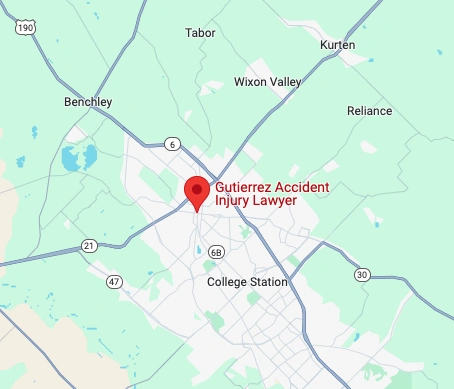The evolution of ridesharing has added new layers of complexity to personal injury claims after car crashes. Competing claims and multiple insurance companies are often involved, so it’s deeply important that you have an experienced Bryan, TX car accident lawyer on your side. Here’s an in-depth guide to protecting your rights if you find yourself injured in a rideshare accident.
3 Steps to Take If You’re Injured in a Rideshare Accident
Take Care of the Immediate
The priorities right after a crash involving a rideshare vehicle remain the same as after any other accident, and taking the right actions protects both your health and your future legal options.
Get Safe
If possible, get to a safe location away from traffic. Call 911 immediately if there seem to be any serious injuries, and do NOT downplay your pain in hopes it will dissipate later.
If there are no immediately serious injuries, you should still go to the hospital to get checked out as soon as possible after you’ve done the rest of the things listed below. Getting checked by a doctor creates an official record linking your injuries to the crash. This documentation is vital for obtaining compensation later, so avoid delays in treatment if at all possible.
Get a Record
Take photos of vehicle damage (including the rideshare car’s identification information visible within the app), the surrounding area, your visible injuries, and anything else relevant to what happened. Even small details can become crucial as you’re piecing together the timeline for legal purposes later.
Get the names and contact information of all drivers involved, plus passengers and witnesses. Specifically, you want everything possible about the rideshare driver, secure their insurance information and the name of the rideshare company (Uber, Lyft, etc.).
Report the Accident to the Rideshare Company
Both Uber and Lyft have procedures for passengers or other motorists to report crashes involving their drivers. This triggers both the company’s insurance process and internal investigations.
Contact a Rideshare Car Accident Lawyer in Bryan, TX as Soon as Possible
After a rideshare accident, you’ll likely be facing a maze of confusing insurance coverage questions and multiple parties who are all potentially liable for your injuries (and all trying to minimize their liability). A lawyer specializing in these cases will be able to give you immediate assistance and begin building your case while the evidence is still fresh.
Determining Liability in Rideshare Accidents
The first step in determining liability is to work out what stage the rideshare driver was in. Just because a driver has an Uber or Lyft sticker in their window doesn’t mean the rideshare company will be liable. If the driver was off-duty with the ridesharing app shut off, their personal auto insurance generally applies. These cases function much like any other car accident, with liability determined by proving which driver’s negligence caused the crash.
If the driver was logged into the app and actively seeking a ride request when the accident happened, but had no passenger, both Uber and Lyft provide drivers with some limited liability coverage in case of an accident during this phase. However, this coverage often has far lower limits than if a passenger is in the car or en route for pickup.
If there was a passenger in the vehicle of the rideshare driver when the accident happened, this generally triggers the rideshare company’s commercial insurance policy, which provides quite a lot of liability coverage. These policies provide for injured passengers, other motorists, bicyclists, and pedestrians, even if the rideshare driver’s personal negligence caused the accident.
Factors Complicating Liability
Rideshare companies go to great lengths to avoid classifying their drivers as employees. This designation would open them to significantly greater liability for accidents, even when the driver’s behavior is blatantly reckless. In cases of catastrophic injuries exceeding lower policy limits, your attorney may argue for broader company responsibility under various legal theories.
Texas follows a concept known as “comparative negligence” when determining liability in an accident. Simply put, negligence means failing to use the same level of care that a reasonable person would exercise in a similar situation. Texas law allows victims to pursue compensation even if they may bear some minor percentage of fault for the crash, although it reduces their recovery proportionally, and anyone who bears more than 50% of fault is barred from seeking compensation entirely. An experienced Bryan, TX car accident lawyer understands how all these issues play into liability and how to best argue your case, even when there are complicating factors.
How a Lawyer Can Help Prove Liability
Rideshare accident cases will often require an especially thorough investigation to untangle potential ambiguities regarding insurance coverage and the liability of multiple parties. Your attorney may employ several investigative strategies to clarify these issues, like analyzing the driver’s logs from the rideshare app to confirm their status at the exact moment of impact and determining which insurance policy potentially applies.
Obtaining cell phone records can expose distracted driving, a common cause of accidents, and establish negligence on the part of the driver, regardless of their status on the rideshare app. Consulting with accident reconstruction experts also helps and can provide a granular analysis of the events leading up to the crash, which is particularly useful in cases where multiple vehicle collisions blur the lines of responsibility.
Compensation for Your Rideshare Accident Injuries
Rideshare crashes can result in the same wide range of injuries as other car accidents, so the types of damages you may be entitled to seek include:
Medical Expense Reimbursement
From ambulance rides to surgeries, hospitalization, physical therapy, medications – and future projected medical care costs if your injuries caused permanent disability –, these expenses form the backbone of your financial compensation. These are clear, tangible costs associated with what happened to you.
Lost Income
Both immediate loss of wages due to missed work during recovery and compensation for long-term diminished earning capacity if you can’t return to your previous occupation are recoverable under Texas law.
Pain and Suffering
These non-economic damages compensate you for the physical pain, emotional distress, and loss of enjoyment of life caused by the accident. While harder to quantify than the other damages, an experienced attorney knows how to argue for appropriate compensation that reflects the full impact on your quality of life.
Punitive Damages
These are very rare, but they do occasionally apply. These damages don’t cover your loss in any way: they’re intended to punish the other party for especially egregious behavior. Talk to your lawyer to discover if these might be worth pursuing in your case.
The Importance of Swift Legal Action
Rideshare companies have powerful legal teams and insurers focused on minimizing payouts. Memories fade, witnesses become harder to locate, and rideshare companies sometimes change their policies over time in ways that can affect your case. The sooner you contact an attorney, the better your chances of preserving valuable evidence and maximizing the compensation you deserve.
Don’t go through this alone. If you or a loved one has been injured in a rideshare accident, contact Brian Gutierrez, Personal Injury Trial Lawyer right away for a free consultation.



